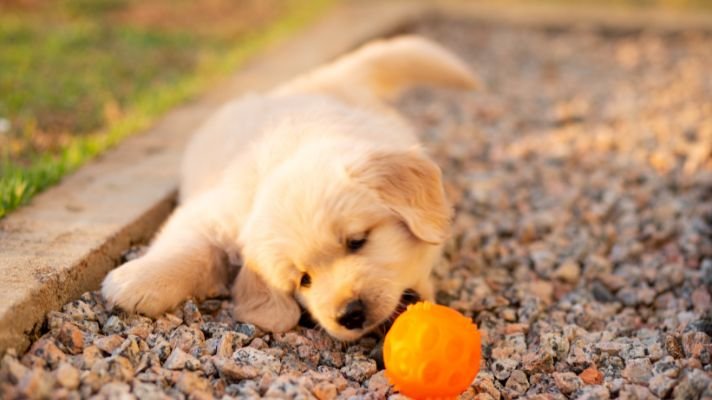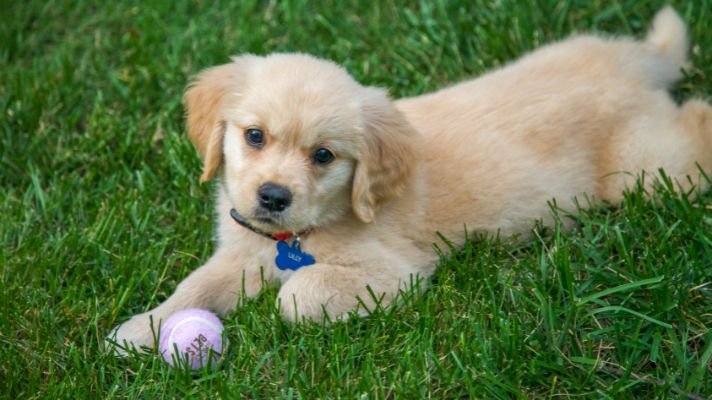If you recently brought a new Golden Retriever puppy to your home and are concerned about your pup’s nipping and biting behaviors, this article is for you.

Like “hoomans,” dogs also get their baby teeth when they are young. As they grow, they lose their baby teeth and get adult teeth. This process is called puppy teething.
Biting and nipping are common behaviors seen in puppies. Fortunately, these behaviors don’t last forever. Once the Golden Retriever puppy has a full set of adult teeth, it should no longer bite.
If you are frustrated with biting, nipping, and chewing behaviors, you must be wondering when Golden Retrievers stop teething. Well, here’s the answer:
Golden Retriever puppies stop teething once they are 6 months or older. All their baby teeth (also called needle teeth) fall out, and adult teeth grow.
Teething starts at 2-3 weeks of age and stops once they lose their baby teeth and get adult teeth at 6-7 months.
Quick links to different sections
ToggleGolden Retriever Puppy Teething Timeline
Puppy and children teething are quite similar. Like humans, dogs also lose their baby teeth and gain permanent teeth as they grow. However, the difference is in the teething timeline.
Here’s the teething timeline of Golden Retriever puppies.
- 2 to 4 Weeks: During 2-4 weeks, the puppy will be with its mother. It is also the time when puppies start getting their baby teeth.
- 5 to 6 Weeks: Once your Golden Retriever puppy becomes 5-6 weeks, it will have all 28 baby teeth grown.
- 12 to 16 Weeks: During this timeline, Golden Retriever puppies’ baby teeth start to fall. Between the process of losing baby puppy teeth and getting adult teeth, they experience pain and discomfort. You may find your Golden pup chewing anything and everything. Get the right chew toys to help your canine during the teething process.
- 6+ Months: At 6 months, the puppy will have 42 permanent adult teeth grown.
Note: Baby teeth are not permanent. All baby teeth should have fallen out at 6-7 months of age. Contact your veterinarian if you notice any baby tooth present while an adult tooth grows next to it.
Puppy Teething Signs
Teething is when the puppy’s baby teeth fall out, and adult teeth start to grow. But how do you know the puppy is teething?
Well, it’s not hard to identify. If you notice your Golden Retriever puppy started chewing excessively suddenly, it’s one of the signs.
Besides excess chewing and nipping, some other signs of Golden Retriever teething are:
- Frequent drooling
- Blood on your puppy’s toys
- Slow eating
- Red or swollen gums
- Crying, whining
- Baby teeth on the floor
Tips To Help A Teething Golden Retriever Puppy
You don’t want your puppy to chew your shoes, furniture, and miscellaneous household items, right?
It can be frustrating to see your canine chewing everything and biting & nipping everyone. Chewing, nipping, and biting is the part of the teething process. Fortunately, this behavior doesn’t last forever.

Here’s what you can do to help your Golden Retriever puppy during this phase.
Chew toys
Teething can be painful for your canine. Giving some chew toys is a great way to not only distract from the pain but also to save household items from being chewed. Get soft as well as durable chew toys.
Puppy-proof your house
Puppy-proofing your house will ensure the safety of your puppy and your house’s safety. Teething creates discomfort. Puppy tries out different stuff to find its favorite chew.
So, even if you bring tons of chew toys, you might see your pup chewing household items.
So, the best thing you can do is puppy-proof your house.
Puppy-proofing the house means creating a safe environment for the canine. Hide or keep items out of reach that is potentially harmful to the puppy.
- Hide wires and cord
- Make plants inaccessible
- Make chemicals inaccessible (detergents, cleaners, etc.)
- Put all medications away
- Keep electronic devices out of reach
- Keep knives, scissors, razors, and other sharp objects out of reach
- Secure trashcans
- Keep toilet lids closed
Training
Training is another great way to help your teething Golden Retriever. During teething, puppies are more likely to bite and nip. Training can correct their behavior.
Training won’t be that hard as Golden Retrievers are intelligent and obedient.
Training tells your pup that nipping or biting is a big NO!
When your puppy nips, discourage the behavior by interrupting and saying, “No!” or “Ouch!”
Once he stops nipping, praise or reward him with something he loves (could be his favorite treat or chew toy).
Tips For Dental Care
Proper dental care from a young age would prevent problems like tartar buildup, gums infection, etc.
- Regular Brushing: Brush your Golden’s teeth at least 2-3 days a week. Once your pup gets used to it, you can start brushing daily. Don’t use normal toothpaste for brushing, as it can be toxic to dogs.
- Dental Treats: Dental treats are made by keeping the dog’s dental health in mind. Dental treats prevent tartar and plaque buildup for better oral health.
- Dental Powder: Adding dental powder to your dog’s meal can freshen your pup’s breath and prevent tartar and plaque buildup.
- Get Chew Toys: Get chew toys that are designed especially for better dental health. Chew toys will massage gums and remove plaque and tartar buildup.
- Feed Right Food: Your canine would eat almost everything you offer. As a dog owner, it’s your responsibility to make sure your dog gets a healthy and nutritious diet. It’s best to ask your vet to prescribe the best food for your canine’s dental health.
- Regular Dental Cleanings: Besides maintaining regular teeth brushing schedule, you also need to take your canine for professional cleanings from time to time. Once a year, you can take your canine for dental cleaning.
Related Questions
What is puppy teething?
Puppy teething is a phase when a dog’s baby teeth grow in and then fall out, and finally, permanent adult teeth grow in. Puppies get their baby teeth at around 2-3 weeks of age. By the time they are 6-7 months old, all adult teeth come in.
When do Golden Retrievers start teething?
Golden Retrievers start teething at around 2-3 weeks. By the time they are 5-6 weeks old, their 28 deciduous (baby) teeth grow in
How long do Golden Retrievers have teeth?
Golden Retrievers teeth for about 5-6 months. Teething starts when they are 2-3 weeks old and stops once permanent adult teeth replace their deciduous teeth at 6-7 months.
How many teeth do Golden Retrievers have?
Adult Golden Retrievers have 42 permanent teeth (20 on the upper jaw and 22 on the lower jaw), while puppy Golden Retrievers have 28 deciduous teeth. As they grow, their 28 puppy teeth are replaced with 42 permanent teeth.
Final Thoughts
Golden Retriever puppies stop teething at around 6-7 months of age.
During the teething phase, they experience discomfort and pain. They start to chew excessively. Any item they come across becomes their target.
You can help your pup survive this period by offering chew toys and teething toys. You can also teach your canine to not to bite or nip.
Make sure you puppy-proof your house to avoid exposing your Goldie to potentially harmful items.
Also Read:
How Fast Can Golden Retrievers Run?
Do Golden Retrievers Bark A Lot?
What Temperature is Too Cold For A Golden Retriever?
TRAIN YOUR CANINE! ⬇️
[adinserter block="1"]



